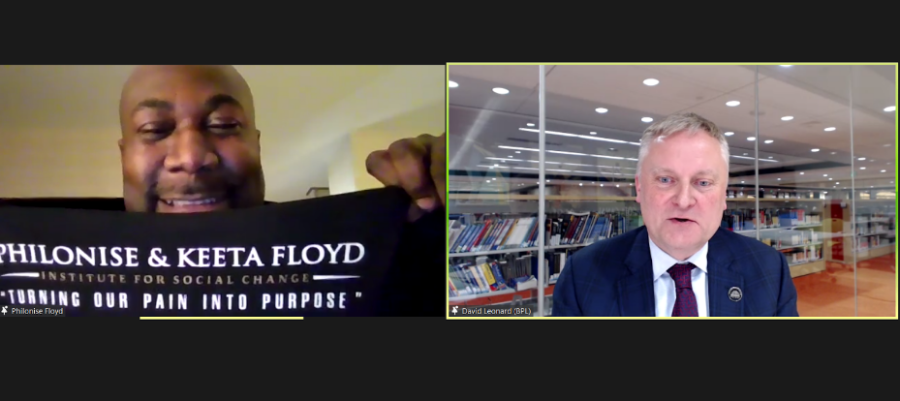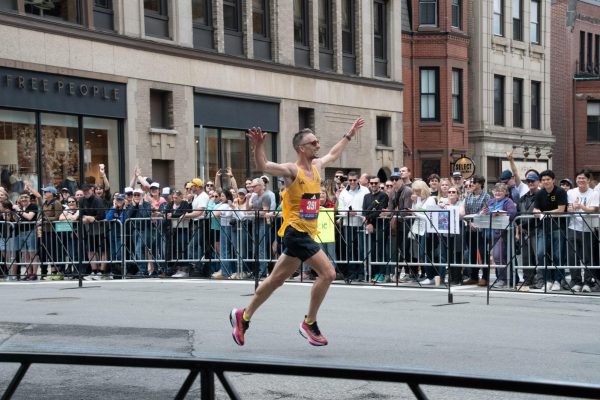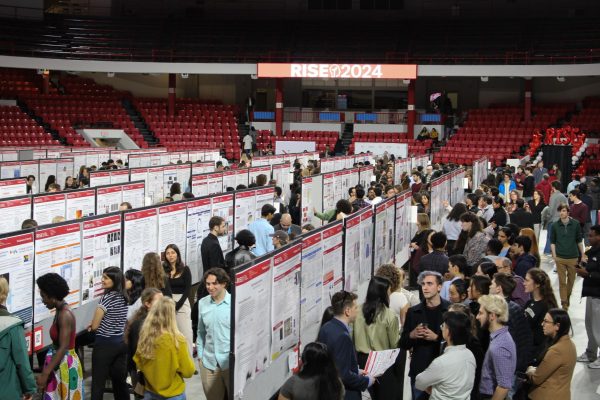Philonise Floyd honors his brother, looks forward
Philonise Floyd displays his t-shirt advertising his foundation. He spoke about his advocacy mission at a webinar Feb. 2. Photo credit to Kathryn Manning.
February 9, 2022
The eldest sibling to survive the late George Floyd, Philonise Floyd shared his perspective on his brother’s death and the widespread protests that swept across the country following George Floyd’s death in May 2020 in a Feb. 2 webinar.
Philonise Floyd spoke at a webinar event as part of the 2022 Lowell Lecture series, a partnership between the Boston Public Library, the Lowell Institute and GBH Forum Network. The event was hosted by David Leonard, president of the Boston Public Library.
Leonard first called upon Philonise Floyd to describe what his brother had been like in their childhood, giving the audience an intimate look into who George Floyd was before making national headlines. Philonise Floyd painted a picture of George Floyd as an upstanding teenager and a caring older brother, challenging the notion that he was a “thug” or “criminal,” as some officials implied after his death.
“Growing up in a poverty-stricken neighborhood, all we had was each other. George was our big brother,” Philonise Floyd said. “He always did his best to try to make sure that we were on a straight path.”
With a lighthearted tone and frequent laughter, Philonise Floyd offered anecdotes about growing up with George Floyd. Despite the fact that he was large for his age, George Floyd was terrified of mice, jumping up on the couch when he spotted one in their childhood home.
“Just being around George had me laughing,” Philonise Floyd said. “He was different, but being who he was, he didn’t care what people thought about him. When people were around him, they lit up.”
Leonard then asked Philonise Floyd to share his experiences directly after George Floyd’s death. Prior to his brother’s death, Philonise Floyd had worked as a long-haul trucker, transporting goods across the country. It was on one of these drives, hundreds of miles from home, where he received a text message with the video of Minneapolis police officer Derek Chauvin kneeling on his brother’s neck.
“I started trying to find my safe haven,” Philonise Floyd said. “I pulled over into a rest area and just cried.”
These tears continued on the drive back to Minneapolis. Upon his arrival, he had little time to mourn with reporters knocking on his front door asking for interviews and outrage turning into protests across the United States.
“I think in the days and weeks following the murder of your brother, some people took to the streets to protest,” Leonard said. “The family, you began to grieve and go through all of those emotions, but at some point you made a decision to shift to action and to do something about what had happened.”
Since then, Philonise Floyd has become an activist against police brutality and an advocate for black communities.
“It was an awakening call for America, for the world,” Philonese Floyd said. “People all across the world witnessed my brother’s murder.”
Philonise Floyd attended Chauvin’s trial, expressing his frustration with the criminal justice system that he found was often too willing to blame the victim.
“I had to go to court, and they put [George] on trial every day,” Philonise Floyd said. “They didn’t put Mr. Chauvin on trial, it was [George] the whole time.”
Philonise Floyd expressed his anger toward the state of the world and the lack of concrete action.
“The fact that these four officers murdered my brother and they got to go home and sleep in their beds while he’s lying in a room with a toe tag on, nothing about that is right,” he said. “Every other day, there’s a black person being murdered. Even the boys in blue, they stay silent. That’s a lot of bad apples.”
To honor his brother and to make change, Philonise and his wife Keeta Floyd created the Philonise and Keeta Floyd Institute for Social Change. The institute works to provide resources for underfunded communities similar to the ones that he and George Floyd grew up in and to combat injustice.
Philonise Floyd also testified in Congress and spoke to the United Nations about systemic racism on a global scale. He spoke with the loved ones of other victims of police brutality to offer comfort and support. He also said he must now fill George Floyd’s shoes as the eldest sibling in his family and check in on his relatives often.
Philonise Floyd ended his lecture with a hopeful message, calling upon audiences to look into their own lives to make a difference.
“If it’s a tough conversation, we need to talk about it until it’s not tough,” he said.
Leonard spoke about the significance of Philonise Floyd’s perspective and what audiences can take away from the conversation.
“In 2020, the name George Floyd became one of the most known rallying cries for racial equity and justice,” Leonard said in a comment emailed to The News. “It was also important to get to know the man through the eyes of his family, to learn more about their struggle for justice as well as discuss the topic of systemic racism.”
Philonise Floyd’s talk was produced by GBH News’ Forum Network program, and a recording of the livestream was uploaded to their website. The Forum Network sponsors similar lectures across the city, fulfilling their mission of making knowledge accessible to the public.
“Our Forum Network is a part of the greater GBH News and it works with different lecture series all across greater Boston,” a spokesperson for GBH said in a statement to The News. “We capture those lectures and compile them on our website for any future panels or discussions. We take the incredible information from these lectures and make them available to Bostonians to help them become better, more educated citizens.”
The Lowell Lecture Series will continue until June with small in-person audiences permitted at future events. The featured speakers will each address the series’ main themes of equity, hope and healing.
Philonise Floyd plans to continue fighting for change and share stories of his brother. He said that he hopes to start a “banana mayonnaise sandwich” challenge on social media, calling on his followers to make and eat his brother’s childhood favorite snack.
“I’m going to make sure that George lives in anybody that is there right now … listening to me,” Philonise Floyd said.


















